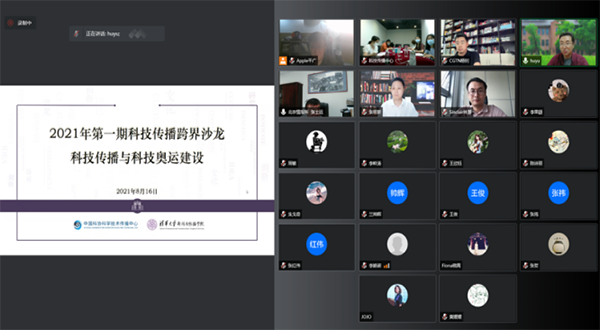The first session of the 2021 Sci-Tech Communication Salon was co-hosted online by the National Communication Center for Science and Technology affiliated to the China Association for Science and Technology (CAST) and the School of Journalism and Communication at Tsinghua University on August 16.

Six professionals talked about the interaction between sci-tech communication and Olympic Games-driven sci-tech development during the virtual event.
Zhang Shiyun, Party chief and president of the Beijing Institute of Science and Technology Information, stressed the coordinated development between science & technology and the Olympic Games.
He said the success of the Olympic Games cannot be separated from technological development.
The application of new technologies will allow host countries to better demonstrate their culture to the entire world and enable worldwide athletes to scientifically improve their physical fitness in sporting events, said Zhang.
Meanwhile, the organization of the Olympic Games will provide new technologies with multiple scenarios to be applied and facilitate the birth as well as upgrading of new technologies. To sum up, their positive interaction has dramatically promoted social development, he said.
Zhang Mingxin, dean of the School of Journalism and Information Communication at Huazhong University of Science and Technology, noted that technology has become a universal symbol in international communication.
He said hosting the 2022 Olympic Winter Games will provide China with an important channel to demonstrate its technological prowess.
The communication of China's technological image should further highlight the cooperative nature of its scientific research and the ultimate goal of serving people around the world, underline the advanced nature of Chinese scientific research and noticeable breakthroughs made by the country in major and core technologies, and demonstrate adherence to a people-centered philosophy in the coverage of Chinese scientific progress.
Li Lingtao, dean of the School of Journalism and Communication at Beijing Sport University, said that the future broadcasting of sporting events should focus on getting audiences fully involved, taking into consideration their overall needs and constantly improving their experience with the support of 5G and other new technologies.
Zhou Min, a professor at the School of Journalism and Communication at Beijing Normal University, made a comparative analysis of technological application in the broadcasting of the Beijing 2008 Olympic Games and the Tokyo 2020 Olympic Games. She also put forward five-point proposals concerning the application of modern technologies in the broadcasting of the 2022 Olympic Winter Games. For instance, more efforts should be done to strengthen the top-level design for aligning the broadcasting of the 2022 Olympic Winter Games with national development strategies, follow a people-centered philosophy, unleash humanistic care of social and technological projects, create new consumption points through the expansion of industrial chains, make innovative developments in technological communication, demonstrate the image of a peaceful rise for China, and provide technical support to the online opening of the 2022 Olympic Winter Games.
Yang Zhao, a producer of technological TV programs with CGTN, said the production of technology-oriented TV programs should be designed to meet the needs of both scientific enthusiasts and ordinary viewers. The broadcasting of sporting and technological programs should grasp the opportunities brought by the 2022 Olympic Winter Games, demonstrate the attractiveness of technology and sports, and make China’s technological image better known.
Lin Yun, CEO of Beijing Xinqing Taike Sports & Technology Co, talked about the ties between technology-driven Olympic Games and technological communication and presented suggestions in response to the insufficient development of China's sports & technology and relevant communication.
The online event also drew the attendance of Chen Rui, deputy director of National Communication Center for Science and Technology of the CAST, and Hu Yu, Party chief of the School of Journalism and Communication at Tsinghua University.